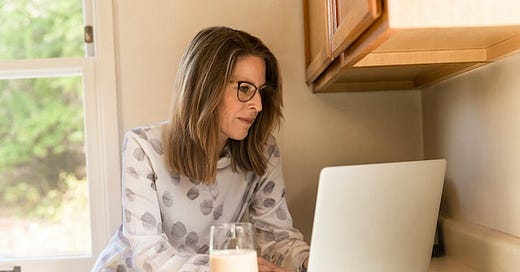Welcome to our #157 weekly newsletter.
“For women taking control of their financial future”
-Jana Hlistova
From The Purse
In this week’s newsletter, we highlight that investors are beginning to recognise the opportunity in women’s health and female investors are a driving force.
And don’t forget to listen to the podcast interview with Abby Davisson, who is a social innovation leader, a career development expert and a co-author of the book: ‘Money and Love: an intelligent roadmap to making life’s biggest decisions’.
Listen to the full interview here.
***
You can review the news in brief so you stay on top of global financial, economic and investing trends.
I hope you enjoy this week’s newsletter.
Until next week,
Jana
Women’s health is underinvested, but change is afoot
Investors are beginning to recognise the opportunity in women’s health.
Early stage investors are beginning to recognise the opportunity in the women’s health market, especially in fertility tracking digital innovations. According to Rock Health, funding rose to $1.4bn in 2022, from $124mn in 2017.
And pharmaceutical companies such as Organon (the spin-off from Merck), are increasing their focus on the women’s health market with products such as hormone replacement therapy (HRT), as reported by the Financial Times.
The women’s health market…
…has been estimated to be worth $3.5tn+. And women:
spend approximately $500bn a year on medical expenses
and control 80% of all healthcare buying and usage decisions.
So why is women’s health is underinvested?
Women only receive 4% of the healthcare R&D budget. And 80% of healthcare VCs have never invested in women’s health.
Men continue to dominate VC investing and have often labelled women’s health as ‘niche’. This is why most investors have (wrongly) assumed women’s health relates to women’s reproductive health.
The result?
Investors have ignored more common issues relating to autoimmune disease, cardiac conditions or endometriosis (which may cause symptoms of menopause).
It is no surprise then that the reproductive healthcare still makes up 95% of the femtech investment space.
In contrast, the menopause market only makes up 5%…
… of the same market (it is valued at $600bn). And this is in spite of the fact that:
13m women are currently in menopause (UK)
1bn+ women globally will be in menopause by 2025.
Many senior women leave the workplace in their 50s because of the menopause- whether they are aware of it or not. Meanwhile businesses haemorrhage talent and money (because of it).
And the highest rates of suicide and divorce is for women aged 51-54 years-the menopausal age.
The US campaign Women’s Health Matters estimates that a $300mn investment in women’s health research could yield a $13bn return in reduced healthcare costs and improved productivity.
But change is afoot…
…as more investors fund women’s health innovation. And more women start and run VC funds which invest in women’s health, including Female Founders Fund, SteelSky Ventures, Coyote Ventures and THENA Capital.
In the case of Coyote Ventures, the fund is not just looking at conditions that solely affect women, but those that disproportionately affect women or conditions in which the symptoms differ between the sexes, such as heart disease, as reported by Forbes.
These female emerging fund managers are attracting women as investors who are often first-time investors. Therefore these female VC fund managers are not only unlocking first-time capital, but crucially they are directing funds towards historically ignored and underinvested female markets.
What next? (Re) listen to The Purse Podcast:
News in Brief
Financial news
The FTSE 100 index closed above 8,000 points for the first time on Thursday, with one analyst suggesting the reason behind demand for U.K. stocks is that “boring is the new sexy.” (It has an abundance of exposure to energy, commodities, consumer staples and healthcare companies).
US 10y yields jump to 3.84%, new 2023 high, following hotter-than-expected US PPI data.
Eurozone will fare better this year than feared as mild winter, high levels of gas storage help to ease energy crisis, & labour market holds up. EuCo expects GDP to grow 0.9% in 2023, higher than +0.3% anticipated in Nov. Inflation expected to slow to 5.6%, prev forecast 6.1%.
EU gas futures slumped <€50 for 1st time in 17mths, as region’s worst energy crisis in decades recedes. Prices plunged >80% from Aug peak when Russia’s gas cuts hit Europe with $1tn in costs due to relatively mild weather, efforts to reduce energy consumption & strong LNG inflows.
UK inflation falls from 10.5% to 10.1% amid ongoing cost of living crisis. That indicates prices across the economy did not rise as quickly as expected in January after a 10.5% reading in December. Economists had predicted a rate of 10.3%.
Warren Buffett's Berkshire Hathaway increased stakes in Apple, Paramount Global and Louisiana-Pacific in relatively quiet Q4. Berkshire didn't open new positions in any companies in the final three months of the year.
Crypto: bitcoin, ethereum, DeFi & NFTs
Bitcoin touched $25,000 for the first time since mid-2022. BTC gained 10% between Wednesday and Thursday. Bitcoin ended the week by retracing to the mid-$24,000 range.
Ethereum rose back above the $1,700 level to start the weekend, with bulls returning to the fold.
Unlike Merge, ethereum's Shanghai upgrade could bring ether price volatility (withdrawals will be open of more than 16.5 million ether (ETH) staked in the blockchain).
Shiba Inu altcoins explode as crypto project hints at release date for ethereum scaling platform.
Binance coin BNB slumped >8% after New York Regulator ordered Paxos Trust to stop creating more of its BUSD token. BUSD is a stablecoin backed by US Dollar, which was created in 2019 in partnership betw crypto platform Binance & blockchain comp Paxos. BNB is native Binance token.
MicroStrategy rallied 22%, adding $53 to its stock price before ending the week trading at $294.
Cathie Wood’s Ark Invest, the investment firm upped its exposure to COIN by acquiring an additional $6.7 million worth of Coinbase shares.
The Purse Podcast
We cover the following in our conversation:
Money and love: how relationships impact our money decisions
How to communicate and negotiate effectively
The 5C decision making framework and how this applies to 3 key life scenarios:
choosing a mate (or choosing whether to marry)
combining family and career
and deciding whether to break up (or to divorce your partner)
How gender norms play into these decisions
And how to create that win-win situation for yourself and for your loved one.
Please enjoy! Listen on Apple Podcasts and Spotify+
Coffee Break? Read This
We’d love to hear from you. Get in touch with Jana via the The Purse website or tweet @jointhepurse and janicka.
The Purse Ltd. Copyright 2023 & All Rights Reserved.
The Purse provides content for informational purposes only, we do not recommend products or services or provide investment advice. Please do your own research or speak to a financial adviser.














Share this post